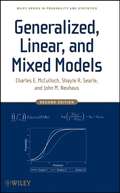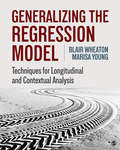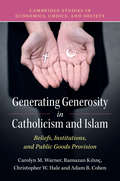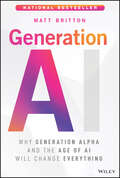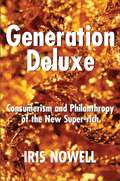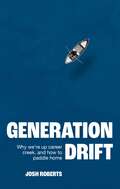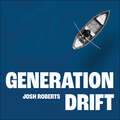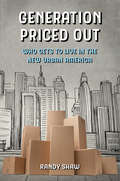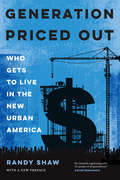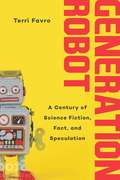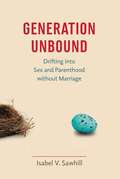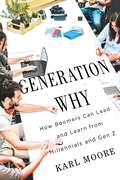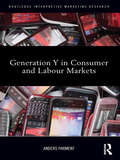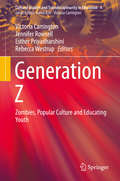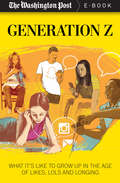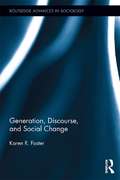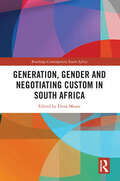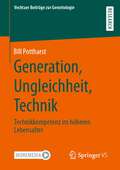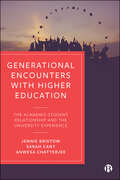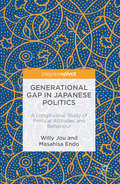- Table View
- List View
Generalized, Linear, and Mixed Models (Wiley Series in Probability and Statistics #651)
by John M. Neuhaus Shayle R. Searle Charles E. McCullochAn accessible and self-contained introduction to statistical models-now in a modernized new edition Generalized, Linear, and Mixed Models, Second Edition provides an up-to-date treatment of the essential techniques for developing and applying a wide variety of statistical models. The book presents thorough and unified coverage of the theory behind generalized, linear, and mixed models and highlights their similarities and differences in various construction, application, and computational aspects. A clear introduction to the basic ideas of fixed effects models, random effects models, and mixed models is maintained throughout, and each chapter illustrates how these models are applicable in a wide array of contexts. In addition, a discussion of general methods for the analysis of such models is presented with an emphasis on the method of maximum likelihood for the estimation of parameters. The authors also provide comprehensive coverage of the latest statistical models for correlated, non-normally distributed data. Thoroughly updated to reflect the latest developments in the field, the Second Edition features: A new chapter that covers omitted covariates, incorrect random effects distribution, correlation of covariates and random effects, and robust variance estimation A new chapter that treats shared random effects models, latent class models, and properties of models A revised chapter on longitudinal data, which now includes a discussion of generalized linear models, modern advances in longitudinal data analysis, and the use between and within covariate decompositions Expanded coverage of marginal versus conditional models Numerous new and updated examples With its accessible style and wealth of illustrative exercises, Generalized, Linear, and Mixed Models, Second Edition is an ideal book for courses on generalized linear and mixed models at the upper-undergraduate and beginning-graduate levels. It also serves as a valuable reference for applied statisticians, industrial practitioners, and researchers.
Generalizing the Regression Model: Techniques for Longitudinal and Contextual Analysis
by Blair Wheaton Marisa YoungThis comprehensive text introduces regression, the general linear model, structural equation modeling, the hierarchical linear model, growth curve models, panel data, and event history models, and includes discussion of published implementations of each technique showing how it was used to address substantive and interesting research questions. It takes a step-by-step approach in the presentation of each topic, using mathematical derivations where necessary, but primarily emphasizing how the methods involved can be implemented, are used in addressing representative substantive problems than span a number of disciplines, and can be interpreted in words. The book demonstrates the analyses in STATA and SAS. Generalizing the Regression Model provides students with a bridge from the classroom to actual research practice and application. A website for the book at https://edge.sagepub.com/wheaton1e (coming soon!) includes resources for instructors and students.
Generalizing the Regression Model: Techniques for Longitudinal and Contextual Analysis
by Blair Wheaton Marisa YoungThis comprehensive text introduces regression, the general linear model, structural equation modeling, the hierarchical linear model, growth curve models, panel data, and event history models, and includes discussion of published implementations of each technique showing how it was used to address substantive and interesting research questions. It takes a step-by-step approach in the presentation of each topic, using mathematical derivations where necessary, but primarily emphasizing how the methods involved can be implemented, are used in addressing representative substantive problems than span a number of disciplines, and can be interpreted in words. The book demonstrates the analyses in STATA and SAS. Generalizing the Regression Model provides students with a bridge from the classroom to actual research practice and application. A website for the book at https://edge.sagepub.com/wheaton1e (coming soon!) includes resources for instructors and students.
Generating Generosity in Catholicism and Islam: Beliefs, Institutions, And Public Goods Provision (Cambridge Studies In Economics, Choice, And Society )
by Carolyn M. Warner Ramazan Kılınç Christopher W. Hale Adam B. CohenUsing an innovative methodological approach combining field experiments, case studies, and statistical analyzes, this book explores how the religious beliefs and institutions of Catholics and Muslims prompt them to be generous with their time and resources. <P><P>Drawing upon research involving more than 1,000 Catholics and Muslims in France, Ireland, Italy, and Turkey, the authors examine Catholicism and Islam in majority and minority contexts, discerning the specific factors that lead adherents to help others and contribute to social welfare projects. Based on theories from political science, economics, religious studies and social psychology, this approach uncovers the causal connections between religious community dynamics, religious beliefs and institutions, and socio-political contexts in promoting or hindering the generosity of Muslims and Catholics. The study also provides insight into what different religious beliefs mean to Muslims and Catholics, and how they understand those concepts.<P> Studies how two mainstream religions with a weak capacity to materially reward or punish members for contributing (or not) to the group still can elicit generous helping behavior, appealing to readers interested in public choice economics and rational choice theory.<P> Studies the impact of the size of the welfare state on generosity and public goods provision.<P> Will address debates in politics, public policy, and in the social sciences about the effect of government-based social welfare on private charity.
Generation AI: Why Generation Alpha and the Age Of AI Will Change Everything
by Matt BrittonA clear, practical guidebook to being a parent and professional in a world transformed by AI In Generation AI, lifelong entrepreneur, futurist, and consumer trend expert Matt Britton explores how artificial intelligence is reshaping society, from consumer behavior to education, work, relationships, and health. As the first generation born into an AI-enabled world, Generation Alpha will experience a paradigm shift in lifestyle and career paths. Britton examines the unprecedented opportunities AI presents: personalized learning, advancements in healthcare, and automated consumer experiences and processes. Britton also confronts ethical and societal challenges, from privacy issues and economic disparity to the potential impact on mental health and job displacement. Balancing optimism with caution, Britton offers a forward-looking guide for leaders, parents, and individuals on how to navigate a future where AI drives cultural and economic transformation. Generation AI explores timely topics including: Consumer Behavior: AI-driven, personalized shopping and the role of the creator economy in capturing mindshare Education: Exploring the future of education and the need for learnings to reinvent itself from a curriculum centered on memorization to one focused on problem solving and creativity Work & Career: A deep dive into the AI powered developments driving disruption in the workplace and uncovering the skill sets needed to thrive Mental Health & Relationships: Examines AI's potential to both connect and isolate, impacting human interaction. Ethics & Privacy: The need for AI guardrails to protect privacy and ensure fairness amid rapid technological advances. Generation AI is a comprehensive and highly practical guide for all individuals looking to future proof themselves in this brave new world—especially Millennial parents, who are raising the first AI generation, grappling with the disruption of AI in their own lives, and seeking to understand the next stages of our technological evolution.
Generation Deluxe: Consumerism and Philanthropy of the New Super-Rich
by Iris NowellThey fork out 100 million for starter castles, 500,000 for a customized Mercedes, and 1.2 million for a watch. While Generation Deluxe explores the spending patterns of the wealthy, a dark underside emerges: excessive consumerism is creating serious damage to the environment and human life. Simultaneously, the super-rich - and celebrities - are raising awareness and spending multi-millions cleaning up the damage and, as never before, funding solutions to global problems of poverty, hunger, and disease prevention.
Generation Digital
by Kathryn C. MontgomeryChildren and teens today have integrated digital culture seamlessly into their lives. For most, using the Internet, playing videogames, downloading music onto an iPod, or multitasking with a cell phone is no more complicated than setting the toaster oven to "bake" or turning on the TV. In Generation Digital,media expert and activist Kathryn C. Montgomery examines the ways in which the new media landscape is changing the nature of childhood and adolescence and analyzes recent political debates that have shaped both policy and practice in digital culture. The media have pictured the so-called "digital generation" in contradictory ways: as bold trailblazers and innocent victims, as active creators of digital culture and passive targets of digital marketing. This, says Montgomery, reflects our ambivalent attitude toward both youth and technology. She charts a confluence of historical trends that made children and teens a particularly valuable target market during the early commercialization of the Internet and describes the consumer-group advocacy campaign that led to a law to protect children's privacy on the Internet. Montgomery recounts--as a participant and as a media scholar--the highly publicized battles over indecency and pornography on the Internet. She shows how digital marketing taps into teenagers' developmental needs and how three public service campaigns--about sexuality, smoking, and political involvement--borrowed their techniques from commercial digital marketers. Not all of today's techno-savvy youth are politically disaffected; Generation Digitalchronicles the ways that many have used the Internet as a political tool, mobilizing young voters in 2004 and waging battles with the music and media industries over control of cultural expression online. Montgomery's unique perspective as both advocate and analyst will help parents, politicians, and corporations take the necessary steps to create an open, diverse, equitable, and safe digital media culture for young people.
Generation Drift: Why we're up career creek and how to paddle home
by Josh RobertsEveryone can escape career creek. All they need is the right paddle.In 2012 Josh Roberts left university with a head full of dreams and a heart full of hope.The world - and in particular the world of work - was his oyster. He was going to get a brilliant job, enjoy a challenging, purposeful career and get stinking rich in the process. Fast forward a decade, though, and success hasn't been quite so easy. Unless you count six jobs in six years, a string of failed 'side hustles' and having a mental breakdown as 'success'. No, like millions of other young workers, Josh spent his twenties drifting aimlessly through his career before resolving, on the eve of his twenty-eighth birthday, to make a change. Which is what Generation Drift is all about. Told with warmth and wit - and brimming with advice from CEOs, recruiters, psychologists and fellow 'drifters' - it's a hopeful, helpful guide to navigating professional uncertainty and finding fulfilling work. This book will share the tools and signposts you need to look to the future with a positive view. Generation Drift is Josh's optimistic, reassuring and practical guide to navigating professional uncertainty and finding fulfilling work.
Generation Drift: Why we're up career creek and how to paddle home
by Josh RobertsEveryone can escape career creek. All they need is the right paddle.In 2012 Josh Roberts left university with a head full of dreams and a heart full of hope.The world - and in particular the world of work - was his oyster. He was going to get a brilliant job, enjoy a challenging, purposeful career and get stinking rich in the process. Fast forward a decade, though, and success hasn't been quite so easy. Unless you count six jobs in six years, a string of failed 'side hustles' and having a mental breakdown as 'success'. No, like millions of other young workers, Josh spent his twenties drifting aimlessly through his career before resolving, on the eve of his twenty-eighth birthday, to make a change. Which is what Generation Drift is all about. Told with warmth and wit - and brimming with advice from CEOs, recruiters, psychologists and fellow 'drifters' - it's a hopeful, helpful guide to navigating professional uncertainty and finding fulfilling work. This book will share the tools and signposts you need to look to the future with a positive view. Generation Drift is Josh's optimistic, reassuring and practical guide to navigating professional uncertainty and finding fulfilling work.
Generation Drift: Why we're up career creek and how to paddle home
by Josh RobertsA practical guide to navigating professional uncertainty and find fulfilling work.In 2010, Josh Roberts left university with a head full of dreams - he was going to find a brilliant career, change the world and make millions in the process. Anything was possible. Fast forward a decade and success hasn't been quite so easy. Unless you count six jobs in six years, a series of failed 'side hustles' and having a breakdown as 'success'. Josh spent his twenties drifting through his career, attempting to get into the 9-5 groove and ultimately, failing to 'nail it'. This left him feeling inadequate and unhappy in the workplace - which only exacerbated his mental health struggles. Faced with the perplexing question 'What am I actually going to do with my life?', he was left both confused and with a pretty depleted sense of self-worth.Josh isn't the only one to feel this way though, he's among millions on the cusp of career creek or years deep and paddling in all directions. However, young workers have shown remarkable resilience in the face of career creek; a willingness to adapt, a hunger to learn new skills and an appetite to launch new businesses - millennials are far from giving up. Which is what Generation Drift is all about. Full of humour and authenticity - and with a diverse supporting cast of CEOs, leading academics, psychologists and fellow notable 'drifters' who have found a way to paddle out of career creek and pursue their goals. This audiobook will share the tools and signposts you need to do the same and look to the future with a positive view. Generation Drift is Josh's optimistic, reassuring and practical guide to navigating professional uncertainty and finding fulfilling work. Everyone can escape career creek. All they need is the right paddle.(P) 2022 Hodder & Stoughton Limited
Generation Priced Out: Who Gets to Live in the New Urban America
by Randy ShawGeneration Priced Out is a call to action on one of the most talked-about issues of our time: how skyrocketing rents and home values are pricing the working and middle classes out of urban America. Randy Shaw tells the powerful stories of tenants, politicians, homeowner groups, developers, and activists in over a dozen cities impacted by the national housing crisis. From San Francisco to New York, Seattle to Denver, and Los Angeles to Austin, Generation Priced Out challenges progressive cities to reverse rising economic and racial inequality. Shaw exposes how boomer homeowners restrict millennials’ access to housing in big cities, a generational divide that increasingly dominates city politics. Shaw also demonstrates that neighborhood gentrification is not inevitable and presents proven measures for cities to preserve and expand their working- and middle-class populations and achieve more equitable and inclusive outcomes. Generation Priced Out is a must-read for anyone concerned about the future of urban America.
Generation Priced Out: Who Gets to Live in the New Urban America, with a New Preface
by Randy ShawGeneration Priced Out is a call to action on one of the most talked-about issues of our time: how skyrocketing rents and home values are pricing the working and middle classes out of urban America. Randy Shaw tells the powerful stories of tenants, politicians, homeowner groups, developers, and activists in over a dozen cities impacted by the national housing crisis. From San Francisco to New York, Seattle to Denver, and Los Angeles to Austin, Generation Priced Out challenges progressive cities to reverse rising economic and racial inequality. Shaw exposes how boomer homeowners restrict millennials’ access to housing in big cities, a generational divide that increasingly dominates city politics. Shaw also demonstrates that neighborhood gentrification is not inevitable and presents proven measures for cities to preserve and expand their working- and middle-class populations and achieve more equitable and inclusive outcomes. Generation Priced Out is a must-read for anyone concerned about the future of urban America.
Generation Robot: A Century of Science Fiction, Fact, and Speculation
by Terri FavroGeneration Robot covers a century of science fiction, fact and, speculation—from the 1950 publication of Isaac Asimov’s seminal robot masterpiece, I, Robot, to the 2050 Singularity when artificial and human intelligence are predicted to merge. Beginning with a childhood informed by pop-culture robots in movies, in comic books, and on TV in the 1960s to adulthood where the possibilities of self-driving cars and virtual reality are daily conversation, Terri Favro offers a unique perspective on how our relationship with robotics and futuristic technologies has shifted over time. Peppered with pop-culture fun-facts about Superman’s kryptonite, the human-machine relationships in the cult TV show Firefly, and the sexual and moral implications of the film Ex Machina, Generation Robot explores how the techno-triumphs and resulting anxieties of reality bleed into the fantasies of our collective culture.Clever and accessible, Generation Robot isn’t just for the serious, scientific reader—it’s for everyone interested in robotics and technology since their science-fiction origins. By looking back at the future she once imagined, analyzing the plugged-in present, and speculating on what is on the horizon, Terri Favro allows readers the chance to consider what was, what is, and what could be. This is a captivating book that looks at the pop-culture of our society to explain how the world works—now and tomorrow.
Generation Unbound
by Isabel V. SawhillOver half of all births to young adults in the United States now occur outside of marriage, and many are unplanned. The result is increased poverty and inequality for children. The left argues for more social support for unmarried parents; the right argues for a return to traditional marriage.In Generation Unbound, Isabel V. Sawhill offers a third approach: change "drifters" into "planners." In a well-written and accessible survey of the impact of family structure on child well-being, Sawhill contrasts "planners," who are delaying parenthood until after they marry, with "drifters," who are having unplanned children early and outside of marriage. These two distinct patterns are contributing to an emerging class divide and threatening social mobility in the United States.Sawhill draws on insights from the new field of behavioral economics, showing that it is possible, by changing the default, to move from a culture that accepts a high number of unplanned pregnancies to a culture in which adults only have children when they are ready to be a parent.
Generation Unbound: Drifting into Sex and Parenthood without Marriage
by Isabel V. SawhillOver half of all births to young adults in the United States now occur outside of marriage. A large proportion are unplanned. These facts suggest that today's young adults are drifting into relationships and are often unprepared for parenthood. What kind of future does this mean for their kids and for society as a whole? In Generation Unbound, Isabel V. Sawhill discusses likely causes for recent changes in the family, such as an increase in women's economic opportunities, the declining economic prospects of men, greater access to birth control and abortion, and new social norms that allow young people more choice #151;but provide less guidance on what it means to be an adult. Isabel V. Sawhill reveals an emerging class divide in patterns of marriage and childbearing: at the top of the ladder are "planners," who are marrying and having children only after establishing a career; at the bottom, and increasingly in the middle, are "drifters" who are having unplanned children early, outside of marriage, and without the stable support of a second parent. This divide is contributing to rising inequality and less social mobility in the U. S. Isabel V. Sawhill sees merit in the views of those on the political left, who argue for more social supports for the less advantaged, including more educational opportunities, expanded child care, parental leave, family-friendly workplaces, and financial assistance. She also agrees with those on the right who argue for traditional marriage as the best environment for raising children. But, she argues that public policies aimed at restoring marriage have not worked and that existing social supports cannot keep pace with an ongoing tide of childbearing outside of marriage. Instead, she points to a third way: greater personal responsibility among potential parents themselves. Drawing on new insights from behavioral economics, and the promise of new long-acting contraceptives, she suggests a future in which more children will be born to adults who want and are prepared to be parents. Contents 1. An Introduction 2. Changes in the Family: More Diversity, a Bigger Divide 3. Why We Should Worry: The Consequences of Choices about Marriage and Childbearing 4. A Growing Class Divide: Planners vs. Drifters 5. The Traditionalists vs. the Villagers: Why Government Alone Can't Solve the Marriage Problem 6. Making Better Decisions: The Need to Change the Default 7. Peering into the Future: Less Marriage, Fewer Children?
Generation Why: How Boomers Can Lead and Learn from Millennials and Gen Z
by Karl MoorePerhaps more than ever before, young people entering the workforce are searching for meaning and authenticity in their careers. This book helps managers understand the postmodern worldview held by generation Z and younger millennials, how it influences their behaviour at work, and how they want to be led in the workplace.Karl Moore takes a practical and down-to-earth approach to understanding what drives millennials and generation Z and how the education system they were brought up in has informed their worldview. Based on hundreds of interviews conducted with under-thirty-year-olds across Canada, the United States, Japan, Iceland, the United Kingdom, and elsewhere, as well as interviews with executives to gain their perspectives on changing dynamics in the workplace, Generation Why provides a thorough study of these generations’ ideas about truth, hierarchy, and leadership.Focusing on listening, purpose, reverse mentoring, feedback, and how people relate to each other in the workplace, Generation Why provides the essential tools for effectively working with millennials and generation Z and unlocking their full professional potential.
Generation Y in Consumer and Labour Markets (Routledge Interpretive Marketing Research)
by Anders ParmentGeneration Y in Consumer and Labour Markets explores the role of people born in the late 1970s and 1980s as consumers and coworkers in an emerging post-modernist society. Having grown up in a branded society overcrowded with commercial messages and a never-ending supply of choices and opportunities, Generation Y not only influences consumption patterns, they also bring their values to work life, thus changing the attitudes towards the employee-employer relationship and how work is being done. Generation Y particularly see work as a venue of self-realization and the boundaries between work and leisure time are becoming blurred—thus the consumer and labor markets converge in some critical dimensions. This book delves into the substantial research body on characteristics and behaviors of the Generation Y, including their relation to other generations and the role of understanding generations in developing effective and attractive organizations. It further outlines the experiences and best practice for attracting, recruiting, selling to, and communicating with Generation Y, based on the author’s experiences from hundreds of organizations where he has been involved as a consultant – offering the reader a better understanding of generations in marketing research, and the impact of generations in employee-employer relations.
Generation Z
by Victoria Carrington Jennifer Rowsell Esther Priyadharshini Rebecca WestrupThis book argues that the mythic figure of the zombie, so prevalent and powerful in contemporary culture, provides the opportunity to explore certain social models - such as 'childhood' and 'school', 'class' and 'family' - that so deeply underpin educational policy and practice as to be rendered invisible. It brings together authors from a range of disciplines to use contemporary zombie typologies - slave, undead, contagion - to examine the responsiveness of everyday practices of schooling such as literacy, curriculum and pedagogy to the new contexts in which children and young people develop their identities, attitudes to learning, and engage with the many publics that make up their everyday worlds.
Generation Z: What It's Like to Grow up in the Age of Likes, LOLs and Longing
by The Washington PostAn in-depth profile of the digital native generation from the Pulitzer Prize-winning newspaper. For the generation after Millennials, technology has been the only way of life since birth. These children are the first group to have their formative moments chronicled on Facebook, to grow up surrounded by the ubiquity of smartphones, and most important, to navigate a social landscape ruled by the internet. With this lifestyle comes a host of issues that prior generations never dealt with, including cyberbullying, alienation from peers with greater access to technology, and an increasing vulnerability to online sexual predators. This series of articles from the Washington Post delves into the everyday lives of American kids and teenagers. With its exploration of the unique pressures and complications of living an online life (and most of life online), this collection is a must-read for anyone who cares about the future of Generation Z.
Generation, Discourse, and Social Change (Routledge Advances in Sociology)
by Karen R. FosterJust what is a generation? And why, if at all, does it matter? This book asks what generation means to ordinary people, arguing that generation is real and it matters, but not in the ways that we think. Generations are not groups of people who can be categorized and attributed with static, immutable and universal characteristics, nor are they reducible to cohorts, as is the tendency in much social research. Rather, the book reveals generation to be a social phenomenon and a mechanism of social change - as a constellation of ideas and discourses that explains what happens when ideas and ideals collide, and why some discourses flourish and take hold at particular times.
Generation, Gender and Negotiating Custom in South Africa (Routledge Contemporary South Africa)
by Elena MooreThis book investigates how customary practices in South Africa have led to negotiation and contestation over human rights, gender and generational power. Drawing on a range of original empirical studies, this book provides important new insights into the realities of regulating personal relationships in complex social fields in which customary practices are negotiated. This book not only adds to a fuller understanding of how customary practices are experienced in contemporary South Africa, but it also contributes to a large discussion about the experiences, impact and ongoing negotiations around changing structures of gender and generational power and rights in contemporary South Africa. It will be of interest to researchers across the fields of sociology, family/customary law, gender, social policy and African Studies.
Generation, Ungleichheit, Technik: Technikkompetenz im höheren Lebensalter (Vechtaer Beiträge zur Gerontologie)
by Bill PottharstIn diesem Buch wird versucht, die Theorieansätze der Technikgenerationen mit jenen der sozialen Ungleichheit auf eine Weise zu verbinden, dass Rückschlüsse auf die Technikakzeptanz, die Technikkompetenz und die Techniknutzung im höheren Lebensalter abgeleitet werden können. Technikroutinen werden im höheren Lebensalter insbesondere durch Prägungen im Lebensverlauf und die soziale Lage in der aktuellen Lebenssituation bestimmt. Unerlässlich scheint, älteren Menschen Zugang zu neuen Technologien zu ermöglichen, ihnen jedoch ebenso genügend Freiraum dafür einzuräumen, auf den Einsatz ungewollter Technologien verzichten zu können.
Generational Diversity at Work: New Research Perspectives
by Emma ParryOver the past decade much attention has been paid to the apparent differences in consumption preferences or workplace attitudes and behaviours across generations. Within Western economies such as the USA, UK and Australia, it is commonly assumed that that there are now four generations in the workplace, namely Veterans (born 1925-1942), Baby Boomers (1943-1960), Generation X (1961-1981) and Generation Y (1982- 2000) The concept of generational differences at work is one that has recently been adopted by practitioners as a basis on which to design human resource management and career management practices. However, there has been some concern in academic circles about the validity of the notion of generations and the evidence base that supports it. There is therefore a need for new perspectives and methodological approaches to investigating generational differences at work in order to establish the validity and value of generations as an axis of diversity. Generational Diversity at Work: New Research Perspectives will address this need by presenting and discussing research into generational diversity that adopts a range of new theoretical perspectives or methodological approaches. This book is designed as a first step in addressing the need to critically examine the theoretical and empirical basis for generational differences and to provide some new empirical data in this area.
Generational Encounters with Higher Education: The Academic–Student Relationship and the University Experience
by Jennie Bristow Sarah CantThe 21st century has witnessed significant changes to the structures and policies framing Higher Education. But how do these changes in norms, values, and purpose shape the generation now coming of age? Employing a generational analysis, this book offers an original approach to the study of education. It explores the qualitative dimensions of the relationship between academics and students, and examines wider issues of culture and socialisation, from tuition fees and student mental health, to social mobility and employment. This is a timely contribution to current debates about the University and an invaluable resource for those interested in education, youth, and intergenerational relations.
Generational Gap in Japanese Politics
by Willy Jou Masahisa EndoAfter decades of stable and seemingly semi-permanent single-party dominance, Japanese politics have gone through fundamental changes since the early 1990s. Government ministries have been reorganised, prime ministerial powers strengthened, and rules for electing the lower house of parliament overhauled. Furthermore, frequent formation, merger, splintering and disappearance of new parties have continued for more than two decades. How do citizens make sense of politics amidst such rapid shifts? The authors address this question by focusing on attitudinal and behavioural changes and continuities with respect to political ideology. They explore what issues citizens associate with ideological terms, where they perceive various parties on a conservative-progressive dimension, and to what extent ideology affects their vote choice. Results of new surveys are also presented to shed light on distinctions between different ideological labels and profiles of radical right supporters. In addition, all topics are discussed with an eye to identifying divergent patterns between older and younger generations.
